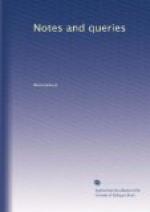Execution of Charles I. (Vol. ii., p. 72.).—P.S.W.E. is referred to An exact and most impartial Accompt of the Indictment, Arraignment, Trial, and Judgment (according to law), of twenty-nine Regicides, &c., 1660.
Therein he will find minutes of the trial and conviction of one “William Hulett, alias Howlett,” on the charge of having struck “the fatal blow.” How far the verdict was consistent with the evidence (or, indeed, the whole proceedings of that court with the modern sense of justice), abler judges than I have long since determined.
On behalf of the prisoner Hulett, witnesses ("not to be admitted upon oath against the king”) deposed that the common hangman, Richard Brandon, had frequently confessed (though he had also denied) that he had beheaded the king. One of these depositions, that of William Cox, is so remarkable that I am induced to transcribe it. If it be true, “Matfelonensis” is certainly justified in saying, “We need hardly question that Richard Brandon was the executioner.”
“William Cox examined.
“When my Lord Capell, Duke Hamilton, and the Earl of Holland, were beheaded in the Palace-yard, in Westminster, my Lord Capell asked the common hangman, said he, ’Did you cut off my master’s head?’ ‘Yes,’ saith he. ‘Where is the instrument that did it?’ He then brought the ax. ‘Is this the same ax; are you sure?’ said my Lord. ‘Yes, my Lord,’ saith the hangman, ’I am very sure it is the same.’ My Lord Capell took the ax and kissed it, and gave him five pieces of gold. I heard him say, ’Sirrah, wert thou not afraid?’ Saith the hangman, ’They made me cut it off, and I had thirty pound for my pains.’”
William Franks Mathews.
Charade (Vol. ii., p. 120.).—I think I can answer Mr. Gatty’s Query as to the authorship of the charade in question. A schoolfellow of mine at Charterhouse wrote the following:
“What’s that which all love
more than life,
Fear more than death or mortal strife;
That which contented men desire,
The poor possess, the rich require,
The miser spends, the spendthrift saves,
And all men carry to their graves?”
This was taken from the original copy, and it was certainly his own invention while at school, and was written about five years ago. I have not seen him since, and do not like therefore to give his name.
While on the subject of charades, can any of your correspondents inform me of either the authorship or the answer of the following:
“Sir Hilary charged at Agincourt—
Sooth! ’twas a fearful day!
The Rufflers of the camp and court
Had little time to pray.
’Tis said Sir Hilary utter’d
there
Two syllables, by way of prayer—
The first to all the young and proud
Who’ll see to-morrow’s sun;
The next, with its cold and quiet cloud,
To those who’ll meet a dewy shroud
Before to-day’s is gone:
And both together to all bright eyes,
That weep when a warrior nobly dies.”




